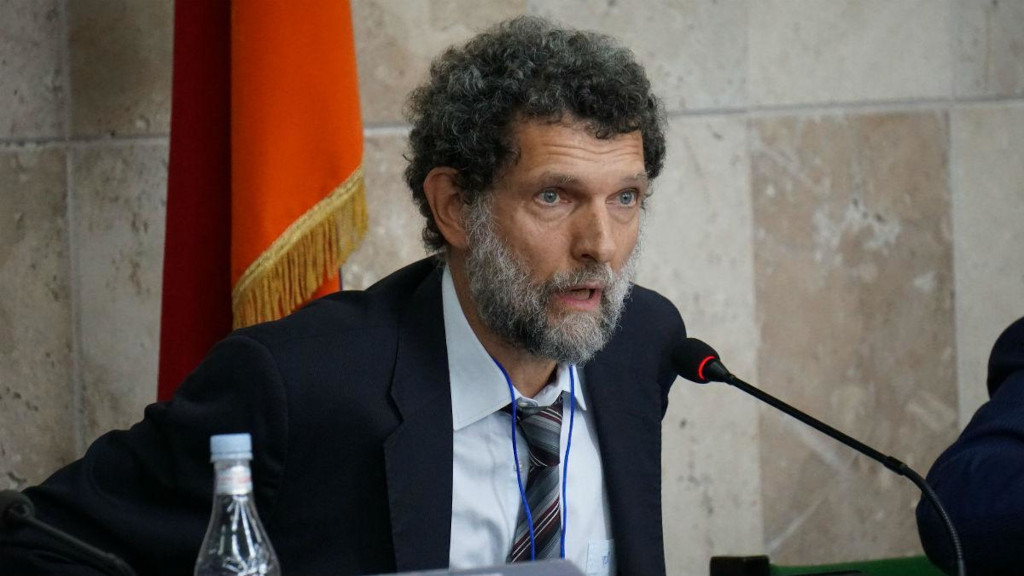Osman Kavala, a prominent businessman and philanthropist who has been jailed since October 18, 2017, said in a written interview he gave through his lawyers with the pro-opposition Halk TV that his detention was unlawful and that the Turkish government was still holding him in prison to lend credibility to the Gezi Park case, the Stockholm Center for Freedom reported.
The 2013 Gezi Park demonstrations, which took place in reaction to the Justice and Development Party (AKP) government’s attempt to destroy one of the few green spaces left in İstanbul, quickly turned into a nationwide protest against the authoritarian policies of then-prime minister and current president Recep Tayyip Erdoğan. Eleven protestors died and thousands more were injured as they were brutally suppressed by the police on Turkish President Recep Tayyip Erdoğan’s instructions.
Turkey has refused to release Kavala despite a 2019 European Court of Human Rights (ECtHR) ruling that found his detention was in pursuance of an “ulterior motive,” that of silencing him as a human rights defender. The non-implementation of the ruling prompted the Council of Europe’s (CoE) Committee of Ministers to launch an infringement procedure against Turkey in February, which is still ongoing.
Kavala pointed out that his detention violates Article 18 of the European Convention on Human Rights, which concerns limitation on the use of restrictions on rights, although dozens of international organizations and political figures have publicly called for his release. He stated that the aim of his imprisonment is to send a deterrent message to those who have participated in mass protests against the government by sentencing people like him to harsh punishment.
Kavala added that President Erdoğan justifies his detention as proof of his crimes, despite repeated release orders and without actually talking about his alleged crimes.
According to Kavala, the political propaganda that “foreign powers” are planning things and acting against the Turkish government is used not only to discredit the Gezi Park protests but also to justify the decline of the economy and accuse the opposition of not working for the national interest. “I think there is also a message in it that the government is supposedly just keeping people in prison whose activities it considers reprehensible, and it is trying to prove that the decisions of the ECtHR and international interventions cannot stop this,” Kavala said.
”The fact that I brought donuts to Gezi Park was cited in the indictment as concrete evidence that I provided financial resources for the Gezi protests. I think it seems necessary to the government that I remain in prison to give credibility to this illogical fiction,” Kavala added.
In addition to the interview, Kavala issued a statement on a website set up for the campaign for his release in which he said: “I keep in mind that I am not the only one who is subjected to unlawfulness, discrimination and cruelty. Listening to the stories of others in prison and seeing people over 80 in the corridors is a constant reminder of this fact.”
Kavala concluded by saying that he believed that if the current government were to change in the 2023 parliamentary elections, not only he but also thousands of other unlawfully imprisoned inmates could be released. However, he said, he tries not to have such expectations because he believes that judicial proceedings in Turkey are not based on law.
Kavala, who had been behind bars since October 18, 2017, was acquitted in February 2020 of charges of attempting to overthrow the government through involvement in the 2013 Gezi Park protests.
Kavala was rearrested the same day of his release on charges related to a 2016 abortive putsch in Turkey in a move described by his lawyers as a tactic to circumvent the court’s 2019 ruling to free him.
An İstanbul court on April 25 sentenced Kavala to aggravated life and his co-defendants to 18 years each on charges of financing the anti-government Gezi Park protests, sparking criticism from governments around the world, including the United States, Germany and France, and NGOs such as Amnesty International.
